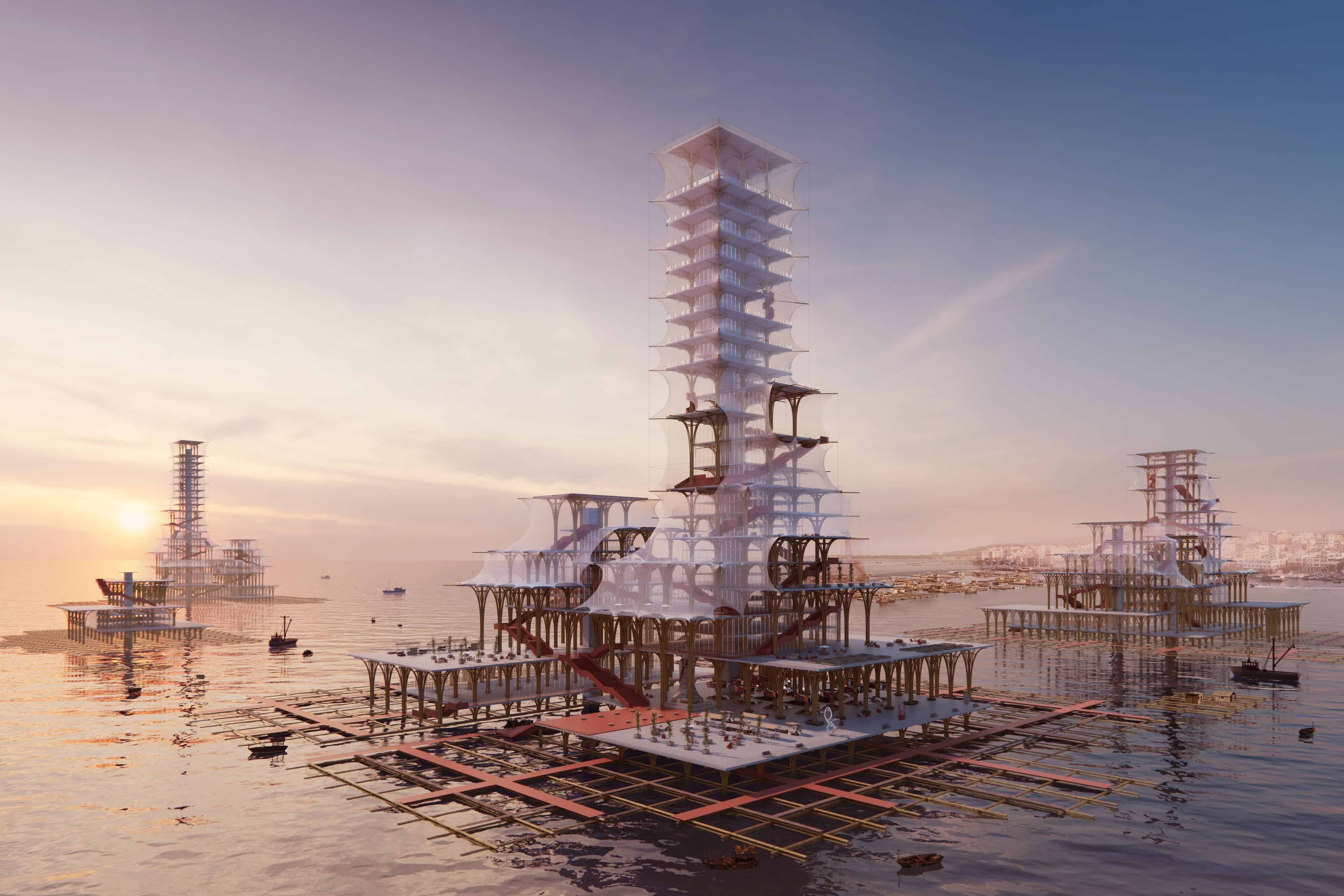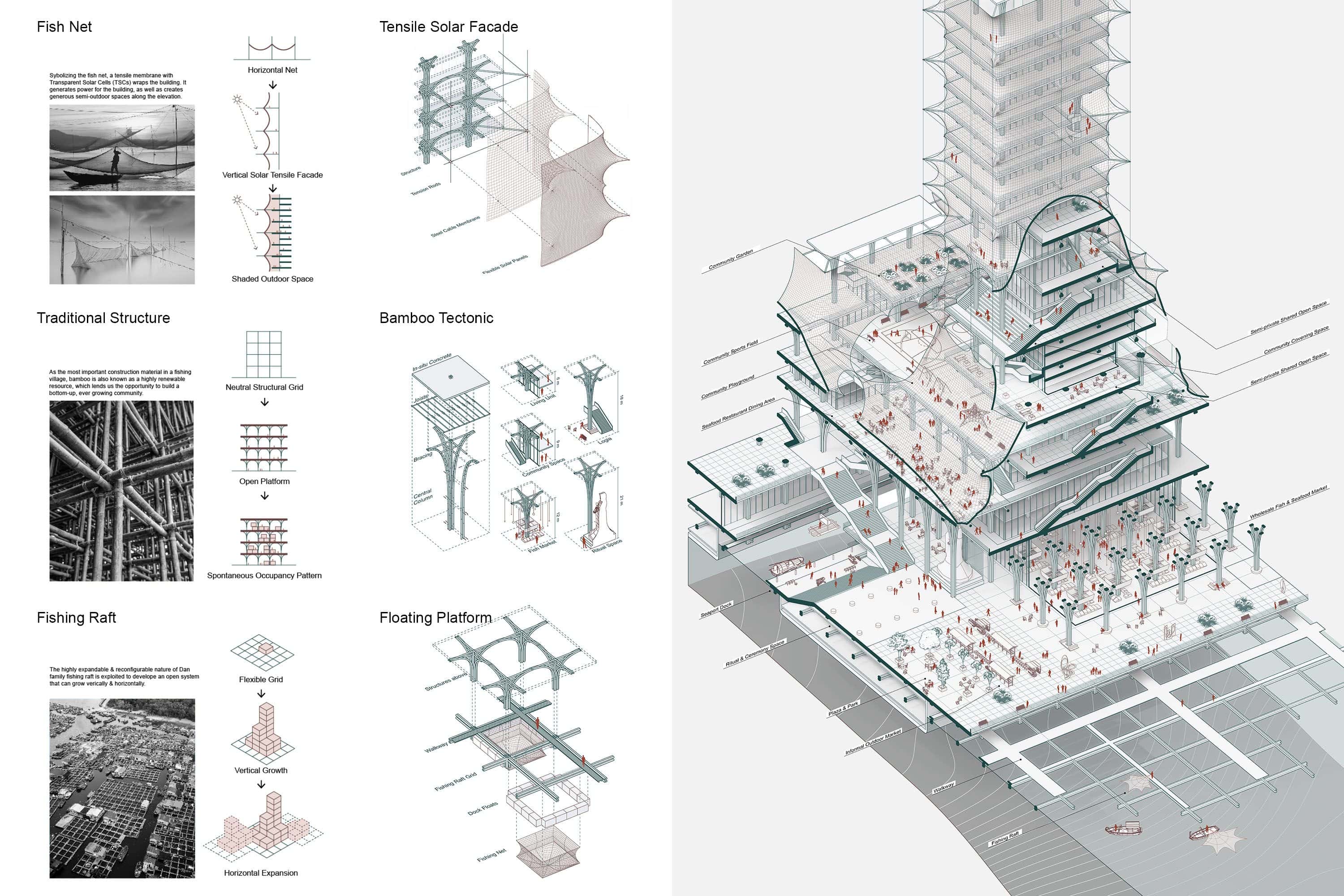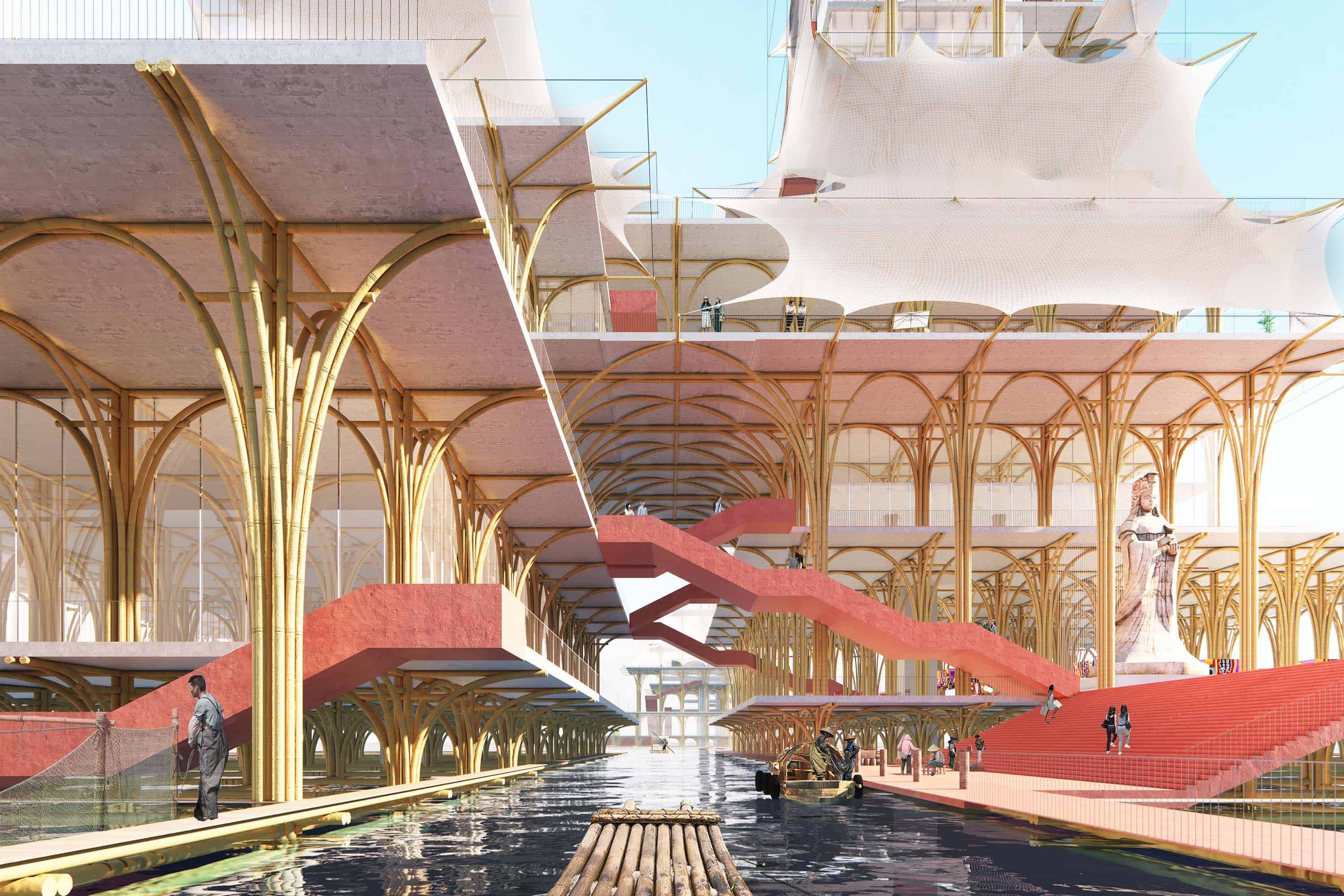The MUSE Design Awards have announced their winners for the first competitive season of 2024. Hosted by the International Awards Associate (IAA), this prestigious competition saw over 8,500 entries from around the globe, underscoring its significance in honoring creative and design professionals.
In this highly competitive season, Renyi Zhang and Xianming Sang have earned the Gold award in the Architectural Design – Sustainable Living / Green category for their project “Floating Livelihood.” This conceptual work, created for the region of Hainan, China, showcases their outstanding innovation and design excellence.






Project Overview: Floating Livelihood
Centuries ago, the Dan Family, restricted from living or working on land, established their coastal settlement. This community, rooted in fishing traditions, now comprises 1,750 families and over 8,300 people in Hainan Province. The residents rely on fishing, seafood farming, tourism, and catering. However, rapid population growth and unplanned expansion have led to significant environmental challenges, necessitating a sustainable settlement model.
The new project in Hainan’s southeast embraces the humid climate, spreading along the coastline to alleviate environmental pressures and leverage marine resources. It introduces a “fishery skyscraper,” a vertical community designed for environmental sustainability. This structure features a multi-level system for recycling energy, water, and materials. It includes seven modular aquaculture typologies to minimize external material needs and a central anaerobic digester for organic waste recycling. The skyscraper aims for self-sufficiency in energy, with solar panels, a system converting waste to thermal energy, and tidal energy generation.
This innovative approach extends to recycling inorganic materials, significantly reducing marine pollution. Deconstructed fishing materials are repurposed for construction or mangrove restoration. The design respects local traditions by incorporating temples and community spaces, alongside commercial and touristic facilities. This floating skyscraper represents a new, adaptable living model for future generations, blending tradition with sustainability.
About MUSE Design Awards
The MUSE Design Awards celebrate excellence across various design fields. The International Awards Associate (IAA) ensures these competitions are accessible and fair, guaranteeing recognition is earned by those who truly deserve it. The rigorous evaluation process involves a panel of industry experts, journalists, and academics. The MUSE Design Awards honor outstanding works in conceptual architecture, innovative transportation systems, futuristic fashion designs, progressive furniture pieces, next-gen electronic gadgets, and groundbreaking biotech innovations.
About Renyi Zhang and Xianming Sang
Renyi Zhang is an architect and urban designer with experience across the U.S. coasts. He holds a Master’s degree in Architecture in Urban Design from Harvard University Graduate School of Design. Renyi has worked at prestigious firms like Sasaki and Perkins&Will, engaging in diverse projects nationally and internationally.
Xianming Sang is an accomplished architect with an MArch degree from Harvard and professional experience at renowned firms such as Perkins + Will, OMA, and Junya Ishigami. Xianming specializes in designing large-scale office and residential buildings and creating innovative spaces for art exhibitions and fashion shows.
Q&A with Renyi Zhang and Xianming Sang
Q: What does “design” mean to you?
A: “Design means envisioning and creating spaces that enhance human experiences while respecting and integrating the natural environment. It’s about innovation, functionality, and aesthetics to meet community needs, solve problems, foster social interactions, and ensure sustainability.”
Q: Do you think your country and its cultural heritage has an impact on your design process?
A: “Our Chinese heritage profoundly influences our design process. The rich cultural, historical, and philosophical traditions of China inform our approach to space, form, and community. Principles like harmony with nature and the balance of yin and yang guide our use of space and light, and our material selection. Additionally, the communal aspect of Chinese society shapes our focus on designs that foster social interaction. By integrating these cultural elements, we ensure our designs are functional and culturally significant.”
Q: Can you explain a bit about the winning work you entered into the 2024 MUSE Design Awards, and why you chose to enter this project?
A: “Our winning entry, ‘Floating Livelihood,’ was selected for its innovative approach to sustainable and adaptive community design. Developed for the Dan Family in Hainan province, China, it addresses cultural heritage preservation and environmental challenges of traditional coastal settlements. We chose this project because it exemplifies our commitment to solving complex issues through architecture, integrating sustainability with economic and social development. The design features a vertical fishery skyscraper using renewable energy and recycled materials, integrating aquaculture with residential and commercial spaces.”
Q: What was the biggest challenge with this project?
A: “The biggest challenge was designing a sustainable and adaptive structure that meets the complex needs of a rapidly growing coastal community while respecting cultural traditions and minimizing environmental impact. Balancing traditional ways of life, like fishing practices and communal living, with modern technological interventions was complex. Additionally, integrating various systems—like renewable energy, waste recycling, and aquaculture—into a single vertical structure required meticulous planning and innovation. Ensuring the ecosystem functioned cohesively without disrupting the local marine environment added another layer of complexity.”
Q: How has winning an award developed your practice/career?
A: “Winning the 2024 MUSE Design Award is a significant milestone, providing recognition and encouragement for sustainable and innovative solutions. It validates our focus on sustainability and motivates us to address environmental and societal challenges, pushing the boundaries of sustainable design in future work.”
Q: How do you see the future of sustainable architectural design?
A: “The future of sustainable architectural design lies in integrating advanced technologies with traditional wisdom. Innovations in renewable energy, materials science, and building technologies will drive more efficient and adaptable structures. However, maintaining a balance with cultural heritage and local traditions will ensure these designs are meaningful and effective for the communities they serve.”
Q: What advice would you give to aspiring architects and designers?
A: “Embrace a holistic approach to design, considering environmental, social, and cultural factors. Stay curious and open to learning from diverse sources, including nature, history, and technology. Most importantly, design with empathy and a deep understanding of the communities you are creating for, ensuring your work enhances their quality of life and sustainability.”
Connect with MUSE Design Awards
This website uses cookies.